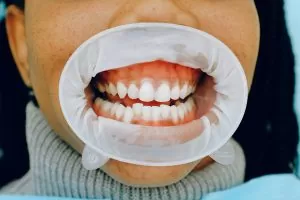
If you’ve ever had a mouth of perfectly aligned teeth – no discoloration, minimal gaps, and just the right amount of shine – only to experience gum recession shortly after, then you know how disheartening it can be. Gum recession is an all too common problem, but that doesn’t mean you have to accept it as the new normal for your mouth. In fact, with proper care you likely won’t have to worry about gum recession all together! Read on to learn more about how we can help prevent this downside from happening in the first place.
What is the meaning of gum recession?
Gum recession is the process where gum tissue surrounding teeth wears away, exposing more of the tooth surface and sometimes even its root. It’s a serious oral health problem that can lead to loose teeth, tooth decay, gum disease and other gum infections. These can be very painful and costly to repair. Symptoms of gum recession include sensitivity around the gum line, gum pockets (areas between the gum and tooth), receding gum lines and inflammation.
What are the common symptoms of gum recession?
Gum recession is a common oral health issue that occurs when gum tissue around the teeth wears away, exposing the tooth root and resulting in weakened gum support. Symptoms of gum recession can include gum sensitivity, especially when your teeth come into contact with cold and sweet foods or drinks, gums that appear farther away from the teeth, visible gum lines and tooth root surfaces, unique gum coloration near particular teeth, and the potential for chronic infection and swelling. If you begin to experience any of these symptoms it is important to talk to your dentist as soon as possible to identify gum recession and create a treatment plan tailored to your needs.
What are the causes of gum recession?
Gum recession is a dental condition caused by several different factors. Excessive gum brushing can cause gum tissue to pull away from the teeth, leaving behind the root surface susceptible to gum disease. Other factors include bruxism (grinding of the teeth) which can wear down gum tissue and damage underlying bone, gum disease (periodontitis), and hormonal changes associated with pregnancy. Smokers are more likely to suffer from gum recession than non-smokers due to decreased blood flow to gum tissue as well as increased risk of gum disease. Poor oral hygiene such as inadequate brushing or flossing can also lead to gum recession over time. All of these causes can make it difficult for gums to keep up with adult teeth, resulting in gum recession and exposing sensitive surfaces of the root structure.
What is the treatment procedure for gum recession?
Gum recession occurs when the gum line recedes from the teeth, leaving more of the tooth exposed. It can be caused by gum disease and aggressive brushing techniques, and can often lead to other problems like cavities and gum sensitivity. Treating gum recession begins with understanding its underlying causes, after which treatment options such as gum grafts or gum flap surgery are employed to restore gum health. Additionally, a regular routine of flossing, brushing and rinsing with an antiseptic mouthwash can help manage gum recession and prevent further tissue loss.
Can you normally avoid gum recession?
Gum recession is a common ailment that can cause serious gum damage if not addressed early on. Fortunately, there are a few proactive steps you can take to protect your gum health and prevent gum recession. Start by brushing your teeth at least twice a day, using soft bristles and gentle strokes. Make sure to floss daily and see your dentist for regular check-ups to spot any signs of gum recession as soon as possible. Avoiding smoking, drinking alcohol in excess, or misusing mouthwash can also potentially reduce the risk of gum recession. Eating a balanced diet that’s low in processed sugars and full of protein, vitamins, and minerals will ensure gum tissue stays healthy and strong. Lastly, don’t forget to gently massage the gum line with a toothbrush after meals, as this stimulates blood flow in the gums which helps reinforce their strength. Taking these proactive measures will help you ward off gum recession so you can maintain optimal gum health!
Visit Edgecliff Dental Care now
Recession of the gums is a serious dental problem that should be avoided. Maintaining good oral hygiene and visiting the dentist regularly can help prevent gum recession. If you are experiencing any symptoms of gum recession, please visit our dental clinic for an evaluation.




